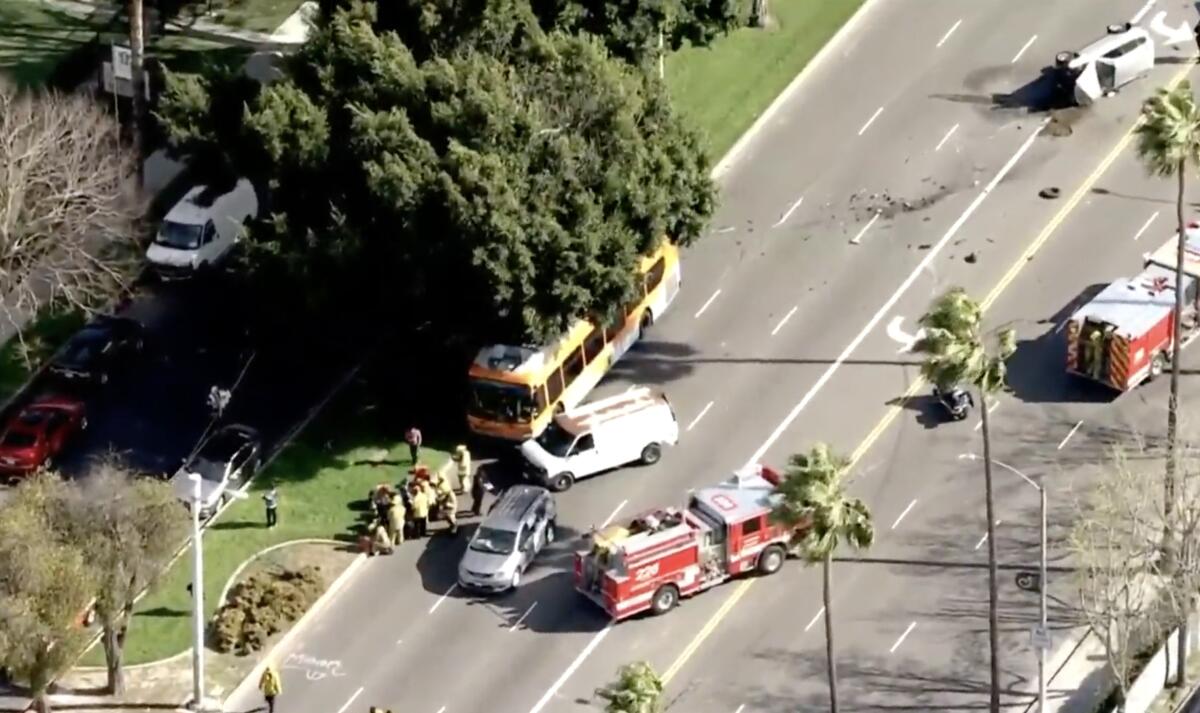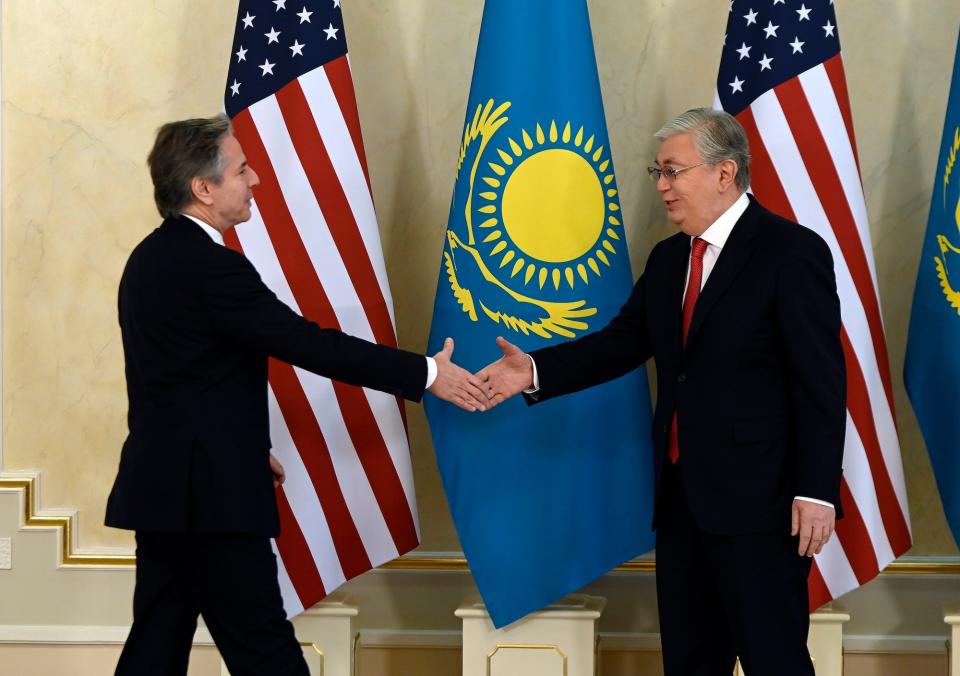World News
At least 14 hurt as L.A. bus is part of multi-car ‘rollover collision’

At least 14 people were injured in a multi-vehicle collision Thursday afternoon in South Los Angeles that involved a Metro bus, according to the Los Angeles Fire Department.
The Fire Department issued an alert at 3:40 p.m. of a “multi-vehicle collision, with rollover, that included an MTA bus with passengers,” off Crenshaw Boulevard at 39th Street in Baldwin Hills.
Firefighters and paramedics were on the scene and had assessed and treated 14 people, including bus riders and other vehicle passengers, according to a 5 p.m. update. Three people were taken to hospitals in “moderate condition” and six in “fair condition.”
“The rest declined ambulance transport to an area hospital after being assessed on scene,” officials said.
It is unclear how many vehicles were involved in the crash, although NBC Los Angeles reported that at least four were involved.

An aerial view of the crash scene.
(KTLA)
Aerial video by NBC showed one badly damaged car rolled over on its side in the middle of the street, and a van whose side was crumpled. The MTA bus did not appear to be seriously damaged. Another car was reportedly towed from the scene.
At least seven fire engines and ambulances could be seen in the aerial video.
World News
Palestinian leader appeals to US to stop Israel's Rafah offensive

Mahmoud Abbas says any attack on city could see large numbers of Palestinians flee Gaza entirely.
Source link
World News
US buys 81 Soviet-era combat aircraft from Russia’s ally for less than $20,000 each, report says

-
The US has purchased 81 Soviet-era combat aircraft from Kazakhstan for $1.5m, the Kyiv Post reports.
-
Kazakhstan, a historic ally of Russia, is engaging more with Western nations.
-
The planes may be used for spare parts or deployed as decoys in conflict regions.
The US has acquired 81 Soviet-era combat aircraft from Kazakhstan, the Kyiv Post reported.
Kazakhstan, which is upgrading its air fleet, auctioned off 117 Soviet-era fighter and bomber aircraft, including MiG-31 interceptors, MiG-27 fighter bombers, MiG-29 fighters, and Su-24 bombers from the 1970s and 1980s.
The declared value of the sale was one billion tenge, or $1.5 million, said the Post.
The motive behind the US purchase remains undisclosed, said the Post, fueling speculation about potential use in Ukraine, where similar aircraft are in service.
Given Ukraine’s continued reliance on Soviet-era weapons, the aircraft could either serve as a source of spare parts or be strategically deployed as decoys at airfields, said the Post.
The Mikoyan MiG-31 was a supersonic interceptor designed to defend Soviet airspace, according to Airforce Technology. It played a critical role during the Cold War.
Derived from the MiG-23, the MiG-27 was a ground-attack aircraft and saw action in conflicts like the Soviet-Afghan War.
The agile MiG-29 excelled in air-to-air combat. It was widely exported and remains in service with some air forces.


Despite its age, the Su-24 – an all-weather tactical bomber – remains in service with several air forces, including the Russian Aerospace Forces and Ukrainian Air Force.
Kazakhstan, formerly part of the Soviet Union, has maintained close ties to Russia and historically was one of its strongest allies. But the relationship between the two countries has shifted since Russia invaded Ukraine, with Kazakhstan aligning itself more with the West, drawing the fury of some in Russia.
But the Central Asian country’s efforts to upgrade its military capabilities coincide with its increasing engagement with Western nations, signaling a shift away from historical ties with Moscow, per the Kyiv Post’s analysis.
President Kassym-Jomart Tokayev’s visit to Germany in 2023 underscored Kazakhstan’s commitment to international sanctions against Russia.
Kazakhstan and Western nations are showing increasing cooperation, with recent diplomatic engagements including a visit from UK Foreign Minister David Cameron to Astana, the capital.


Secretary of State Antony Blinken visited the central Asian country in March 2023, where he said that the US “strongly supports Kazakhstan’s sovereignty, its independence, its territorial integrity,” according to news agency AFP.
Some of Russia’s outspoken propagandists have suggested that Russia should look to Kazakhstan next following its invasion of Ukraine.
One notable Russian TV commentator, Vladimir Solovyov, said that his country “must pay attention to the fact that Kazakhstan is the next problem because the same Nazi processes can start there as in Ukraine.”
Agreements on trade, education, environment, and mineral supplies reflect the deepening ties between Kazakhstan and Western nations as they navigate geopolitical challenges posed by neighboring countries like Russia, China, Afghanistan, and Iran.
Read the original article on Business Insider
World News
Opinion: How a California innovator revolutionized the treatment of rape victims

It’s impossible to know how many lives Gail Abarbanel has saved.
For decades, she has been singularly devoted to changing the way the world perceives and speaks about rape, and to helping victims of all ages heal from the trauma of sexual assault.
After 50 years as director of the Rape Treatment Center at UCLA Santa Monica Medical Center, she recently stepped down. She’s not retiring, she insisted to me recently when we met for lunch in Santa Monica, she’s just forging a new path.
I met Abarbanel 30 years ago, when she invited me to attend one of the center’s annual fundraising brunches at Ron Burkle’s lavish Greenacres estate in Beverly Hills. These were celebrity-studded events, often hosted by the casts of popular TV shows like “Friends” or “ER” or “Mad Men.”
But the afternoon’s stars were always the rape victims who would share their stories with the hushed crowd. (And yes, Abarbanel uses the word “victim” not “survivor.” “They are victims,” she says.)
In 1994, the young woman who told her terrible story was the 24-year-old granddaughter of a famous movie producer. She grew up in Beverly Hills, not far from Greenacres. When she was 12, her father fired the family nanny and began raping her at night. He told her they had been lovers in a previous life. By the end of high school, after she had gathered the courage to leave home and reveal the abuse, she found solace at Stuart House, the Rape Treatment Center’s extraordinary refuge for children who have been sexually abused. Her father went to prison; she grew up to be a household name.
“There is nothing more powerful than hearing the victim tell their experience,” Abarbanel told me.
::
A Los Angeles native, Abarbanel began her career as a social worker in Santa Monica. She had no particular interest in rape victims, but in the early 1970s, she was asked to see a young woman who had been hospitalized after a suicide attempt. Less than a week earlier, it turned out, the young woman had been raped by a stranger on the beach.
“I was just so moved when I uncovered the rape,” Abarbanel told me. “And that was the beginning.” She soon realized how poorly rape victims were treated — by police, prosecutors, defense attorneys, judges and doctors and nurses — and how little was understood about their trauma, which was often invisible.
Emergency rooms could be a nightmare. “There were no protocols for collecting evidence, no sensitivity,” Abarbanel said. “Nurses would come out into the waiting room and say, ‘Where’s the rape?’ ”
The legal system was stacked against victims. An alleged rapist would be charged only if a victim had demonstrated physical resistance “to the utmost,” as the law puts it. If a victim hadn’t fought back and gotten injured, she couldn’t credibly claim she was raped.
In court, victims were shamed and treated as if they were on trial; their sexual histories and the way they dressed could be used against them. If a case ever made it to a jury, judges were required to instruct that “rape is a charge that is easily made and hard to defend against so examine the testimony of this witness with caution.”
That has all changed in the 50 years since Abarbanel founded the Rape Treatment Center in 1974, and largely because of her work.
Her great innovation, much copied now, was the creation of a 24/7 one-stop shop for victims, with medical personnel, therapists and detectives and prosecutors coordinating under one roof. The idea was to empower victims, to make them feel safe and heard and supported.
In 1986, Abarbanel and attorney Aileen Adams, the first counsel for the Rape Treatment Center, created Stuart House. Before that, the treatment of child victims, even more so than adults, was egregious. Kids who disclosed abuse were ferried around to five or six different agencies, interviewed and re-interviewed by a succession of adult strangers. There was a lack of specialized forensic care, and very little specialized therapy. At Stuart House, children receive specialized pediatric forensic exams and extensive medical and therapeutic support. And they have to tell their stories only once.
::
In 1977, Abarbanel received a call from a man she’d never heard of. His name was Norman Lear, and he wanted to hire her as a consultant for a special episode of his hit TV series “All in the Family.”
“If you could talk to 40 million people about rape,” Lear asked Abarbanel, “what would you want to say?”
First and foremost, she told him, she wanted people to stop blaming victims.
That two-part episode, “Edith’s 50th Birthday,” was a seminal moment in the portrayal of rape on TV. Washington Post TV critic Tom Shales called it “shattering” and “brilliant.”
It also marked the start of an important alliance between the Rape Treatment Center and Hollywood. Abarbanel consulted on shows like “Lou Grant,” “Hill Street Blues, “Cagney & Lacey,” “L.A. Law” and “Grey’s Anatomy,” all of which helped nudge the culture away from victim blaming toward a more compassionate view of the trauma of rape.
Working with Hollywood was fun, said Abarbanel, who is petite, soft spoken and publicity shy, “but I always wanted to get back to work.”
Lear, who died last year, joined the center’s first board and frequently hosted its annual fundraising brunch.
When Abarbanel needed to raise money to get the Rape Treatment Center going, women who worked for Lear — many of whom had their own experience with rape — put her in touch with the prolific fundraiser Sandra Moss, who was married to A&M Records co-founder Jerry Moss.
At a luncheon organized by Moss at Mr. Chow’s in Beverly Hills, Abarbanel remembers being approached by Ruth Berle, Milton’s wife. “Honey,” Berle told her, “If you want to get money, you have to get the men.”
Moss made sure, when she hosted the first fundraiser for the center in her home, that the living room was full of important Hollywood men. “Norman had sent them all telegrams,” Abarbanel said. “Telegrams!”
At one of the fundraising brunches, the legendary producer Sherry Lansing was so inspired, she stood up and announced, “I’m going to do something!” And so she did; in 1988, she produced “The Accused,” a commercial and critical success. Its star, Jodie Foster, won her first best actress Oscar for portraying a woman gang-raped in a rowdy bar.
It’s impossible in this space to list all the Rape Treatment Center’s firsts. It has been responsible for changing laws, changing how we think, for educating hospitals, police departments, college presidents, school principals and athletic coaches about rape and rape prevention.
“I feel really good about what I’ve done,” Abarbanel told me. “I really do.”
She should. After all, she’s accomplished the rare feat of actually making the world a better place.
-

 African History3 months ago
African History3 months agoBlack History Facts I had to Learn on My Own pt.6 📜
-

 African History1 year ago
African History1 year agoPROOF AFRICAN AMERICANS AIN'T FROM AFRICA DOCUMENTED EVIDENCE
-

 African History2 years ago
African History2 years agoHow Did Normal Medieval People Survive Winter? | Tudor Monastery Farm | Chronicle
-

 African History4 years ago
African History4 years agoA Closer Look: Afro-Mexicans 🇲🇽
-

 African History3 years ago
African History3 years agoThe Entire History of Africa in Under 10 Minutes – Documentary
-

 African History1 year ago
African History1 year agoA Black African King in Medieval European Art
-

 African History2 years ago
African History2 years agoAFRO MEXICO: Black History In Mexico!
-

 African History3 years ago
African History3 years agoWhat happened to the many African Kingdoms? History of Africa 1500-1800 Documentary 1/6































